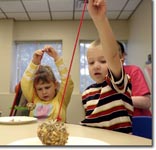First genome scan for Autism Spectrum Disorders completed
 Washington, October 23 : The Autism Consortium, a group of leading universities and medical centres in the Boston area, has announced the completion of first genome scan for Autism Spectrum Disorders (ASD) through its Autism Gene Discovery Project, and has released the reference data set to a database that scientists researching into the condition can use.
Washington, October 23 : The Autism Consortium, a group of leading universities and medical centres in the Boston area, has announced the completion of first genome scan for Autism Spectrum Disorders (ASD) through its Autism Gene Discovery Project, and has released the reference data set to a database that scientists researching into the condition can use.
The genome scan was conducted with the help of a new, high-resolution microarray technology developed by Affymetrix Inc. scientists. It involved genetic data from more than 3,000 children with ASD and their families.
“Today’s release of genetic and phenotypic data on autism marks a significant achievement for the autism research community,” said Dr. Thomas Insel, Director of the National Institute for Mental Health.
“Progress in finding the causes and cures for autism spectrum disorders rests in large part on improving the rapid access and sharing of data and resources That the Consortium is making the data available to the scientific community even before its own researchers have fully analysed the information, demonstrates their high degree of commitment to and leadership in advancing autism research,” he said.
Coupled with the complementary data generated by Dr. Aravinda Chakravarti at Johns Hopkins, these data provide the most detailed look to date at the genetic variation patterns in families with autism.
Dr. Mark Daly, a Consortium member with the Center for Human Genetic Research at Massachusetts General Hospital and a senior associate member of the Broad Institute of Massachusetts Institute of Technology and Harvard, released genetic data from genome wide scans of DNA variation collected from 3,000 individuals who are either affected by autism spectrum disorders, or are family members of individuals with autism.
The DNA samples for the project were provided by the Autism Genetic Resource Exchange (AGRE), a program of Autism Speaks, which is dedicated to accelerating the pace of autism research.
“We’re releasing raw genotype data so that other qualified researchers can take a look at it even as we’re still beginning our own analysis. Autism Spectrum Disorders are extremely complex and only through collaboration with researchers with many specialized areas of expertise will we gain an understanding of what makes some children susceptible. That’s why we have been committed to providing the data to the research community as fast as we can. The new data will be deposited in the gene bank maintained by AGRE, which, in turn, will make the data available to qualified researchers,” Dr. Daly said.
“It is really something of a landmark to have both data from his laboratory and mine available to autism researchers at virtually the same time. We will each look carefully at the other’s findings as we continue to search for definitive information about which genes are important in causing autism spectrum disorders,” added Dr. Chakravarti, who collaborated with Dr. Daly for many years.
The researchers wrote two mathematical algorithms to analyse the genome scan for specific genes involved in autism spectrum disorders, or for the absence of genes that ought to be present.
The consortium’s Gene Discovery Group found, among other things, what they believe may be important new information on the genes involved in autism spectrum disorders.
The researchers are now planning to conduct an association analysis to determine the role that the genetic variations identified by them play in autism spectrum disorders.
“Autism spectrum disorders present major challenges for families, communities, and the health care system,” said Peter Barrett, president of the Autism Consortium.
“Our job is to accelerate new ways to diagnose and treat autism spectrum disorders by breaking down barriers. In this case, we are working to foster collaboration between scientists from multiple institutions. Autism spectrum disorders are the focus here, not any single scientific group’s accomplishment. What we've shown within a year is that when people work together toward a common goal, we can speed up our understanding of these disorders and move towards better ways to help individuals with autism spectrum disorders and their families,” he added. (ANI)